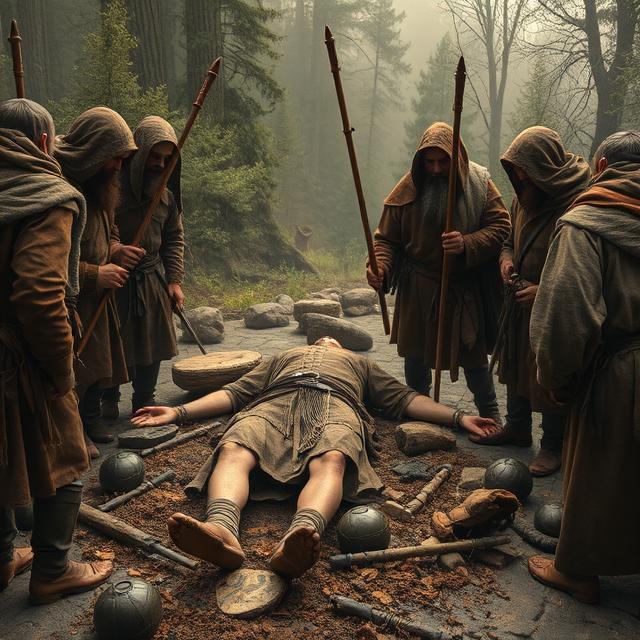Dawn breaks over the village, gray light spilling across the water and streets like a cold promise. You rise with the fishermen, muscles stiff, body still trembling from the flight from Aldebryn. The oars are foreign in your hands, heavy and awkward. Margaret’s mother and sister watch silently as you stumble through the motions, the rhythm of the waves mocking your ineptitude.
The first day is chaos. Nets tangle around your arms, fish slip from your grasp, and the men mutter under their breath. Salt burns your eyes, wind bites your cheeks, and the sea seems to laugh at every failed attempt. The women do not scold openly, but their eyes pierce through you, silent judgment that presses heavier than words. You feel exposed, small, a failure in their presence.
By the second day, exhaustion dulls you. You rise before the sun, muscles trembling, only to repeat yesterday’s mistakes. The villagers glance at you uneasily. The elders whisper, calculating. You were given a chance to prove yourself, but the gods demand merit, not effort.
By the end of the week, your failure is undeniable. The elders confer in low tones. The threat once veiled is now certain: you are to be offered to Odyn. The storm-god expects sacrifice, and you are to meet him.
Still, the days until the offering stretch long. You are kept near the water’s edge, fed, clothed, bathed. Your hands, once accustomed to sword and saddle, now lie idle, but your body is cared for as if you were royalty. For a time, the constant attention dulls the ache of grief, and you almost forget the weight of your past. You walk the cliffs at dawn, watch the horizon, let the waves whisper to you. For brief hours, life feels suspended, fragile yet almost gentle.
Three weeks pass in this uneasy routine. You train in the motions of labor you cannot master, watch the sea and sky, laugh quietly at gulls diving for scraps, at children running barefoot along the docks. Comfort brushes against your skin, but it is a fragile, fleeting illusion. Death looms regardless.
The night before the sacrifice, you sit on the cliffs, staring at the dark swell of the sea. Acceptance settles into your bones. You are ready. You will meet whatever fate the gods demand, and perhaps, finally, sorrow will release you.
Morning arrives with a chill, ceremonial and precise. Villagers gather near the cliffs, the carved bones laid upon a stone slab. You are brought forward, hands bound loosely, eyes scanning the faces around you — elders, villagers, Margaret’s mother and sister. You kneel on cold stone, wind tugging at hair and cloak, and wait.
The bones rattle, tumbling across the slab, and the world seems to hold its breath. When they settle, your name is not called. You are spared. Shock, relief, disbelief — all collide in your chest. Once again, someone else took the fall for you.

The villagers murmur prayers, exhale quietly, and the women at your side allow themselves faint smiles. You live. Another year, another day, another chance.
Life resumes, but differently. You no longer work the nets. Immunity protects you, though the comfortable hut vanishes; you are free but without luxury. You wander among the villagers, their resilience a constant reminder that life demands endurance, adaptation, and patient survival. The sea continues to roar, indifferent, and you remain, an exile at the edge of the world.
Days pass into weeks, weeks into months. The cliffs and waves become companions; the village, and the women who care for you, your only anchors. You are alive, far from Aldebryn, Moravice, and Claudius — distant from all that once defined you. Memories press like stones against your chest, but you move forward, a shadow among the living, surviving because fate allows it.
You do not reclaim your title or lands. You do not return home. You are spared, and that is all. The cliffs and the sea, the wind and gulls, are constant witnesses to your endurance. You live day by day, the exile at the end of the world, surviving beyond destiny, beyond expectation, beyond hope at the edge of the world. You are no longer a duke, no longer a noble, no longer a man with destiny to fulfill. You are a survivor, a witness to life, a shadow among those who have chosen to live and labor.
You stare at the sea and think of all that has been taken — and all you have taken in return. Revenge, you realize, is not fire but frost. It burns nothing; it preserves the wound, keeps it untouched, unhealed, a monument to pain. You sought justice and found silence. You sought meaning and found the sea.
There is no balance, no final reckoning — only endurance. What is lost stays lost, and what remains is neither victory nor defeat, but the slow, stubborn act of breathing.
You have learned that grief is the truest form of memory, and that even in exile, the heart remembers its purpose: to beat, again and again, until the echoes fade.
And so you stand at the world’s edge, the waves breaking beneath you, knowing at last that some wars are not meant to be won — only survived.
…..
THE END
…..

One Comment